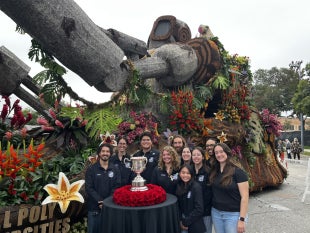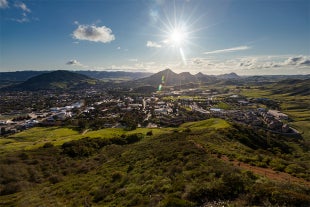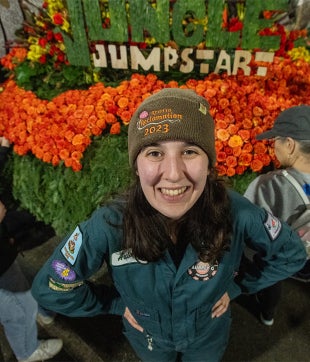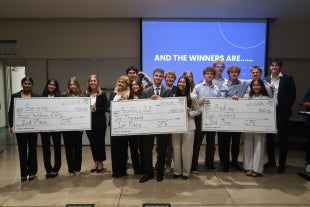Congressman Salud Carbajal Celebrates Educational Partnership Agreement with Air Force Research Lab and Cal Poly
Contact: Charlotte Tallman
805-756-6402; ctallman@calpoly.edu
SAN LUIS OBISPO — Congressman Salud Carbajal celebrated with Cal Poly leaders the cutting-edge aviation research aerospace faculty and students are conducting during a tour and ribbon cutting of the university’s ground station on April 11.
The celebration, held at Cal Poly’s hangar at the San Luis Obispo County Regional Airport, located about 5 miles from campus, follows a $5 million federal grant as part of the university’s educational partnership agreement with the Air Force Research Laboratory (AFRL) that allows engineering students to conduct research on a general aviation airplane that is being modified to fly as an unmanned aerial vehicle, or UAV.

Photos by Joe Johnston | Cal Poly University Photographer
Cal Poly President Jeffrey D. Armstrong, College of Engineering Dean Amy S. Fleischer and Carbajal spoke to a group of dignitaries and project manager Paulo Iscold. Later, student researchers at the hangar facility provided a tour of the facility and the UAV being worked on.
Also in attendance were: Charles Chadwell, associate dean for faculty affairs and infrastructure for the College of Engineering; Aerospace Engineering Department chair David Marshall; and Dawn Neill, administrator in charge of the university’s Research, Economic Development and Graduate Education that supports Cal Poly faculty and students in their pursuit of excellence in their research and creative efforts.
The Cal Poly funding represents half of $10 million appropriated to Cal Poly and California State Polytechnic University in Pomona through the Consolidated Appropriations Act (H.R. 133) to advance unmanned vehicle and drone technology.
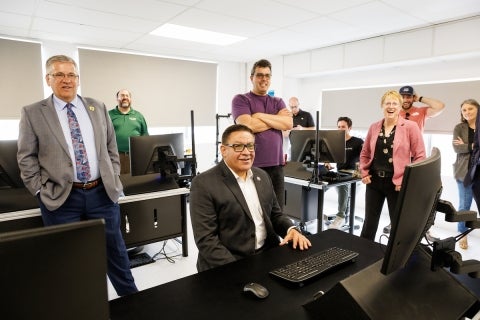
Photo by Joe Johnston | Cal Poly University Photographer
“I’m so excited to celebrate this next step in the $10 million I helped secure for this project in the fiscal year 2021 defense appropriations bill, as well as tout partnerships like the one that Cal Poly and the Air Force have forged here,” said Carbajal whose congressional district includes San Luis Obispo County.
“We’re honored,” add Fleischer, “that our elected officials and the Air Force Research Lab recognize and acknowledge the incredible things our students and faculty do. While this funding will benefit Cal Poly, the work that is done with the money will ultimately advance society.”
Carbajal (D-Santa Barbara) worked with fellow Californians Rep. Grace Napolitano (D-El Monte), and Rep. Norma J. Torres (D-Pomona) to secure the funding. To date, Carbajal’s efforts tied to the AFRL, the primary scientific research and development center for the Department of the Air Force, have brought in approximately $22.5 million in research funding and projects to Cal Poly.
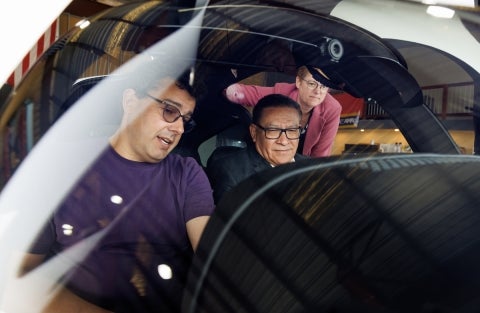
Photo by Joe Johnston | Cal Poly University Photographer
“This partnership means not only will cutting-edge technologies be developed on the Central Coast,” Carbajal said, “it also means that Mustangs will be getting the hands-on learning opportunities to make them into some of the most employable, successful and accomplished young professionals in their field. Because we can't advance technology without people.”
The AFRL, based near Dayton, Ohio, at Wright-Patterson Air Force Base, is interested in research to further advance the priorities of U.S. National Defense Strategy and the need for a new generation of unmanned and autonomous vehicles while creating a pipeline for future employees at research labs. The federal support will also increase the autonomy, safety and security of unmanned aerial vehicles for widespread application.
Iscold, an associate professor of aerospace engineering at Cal Poly, said the plane his students are fine-tuning is a laboratory in the sky, with a flight data acquisition system, a line-of-sight communication system and various prototyping equipment in the ground station providing additional Learn by Doing opportunities.
“Very few universities worldwide provide this type of opportunity,” said Iscold, a pilot who has built multiple record-breaking planes.
The new four-seat, turbo-charged plane is an “optionally piloted aircraft,” he added. A pilot will always be aboard, but the craft was altered by students and faculty to fly without one, simulating a UAV.
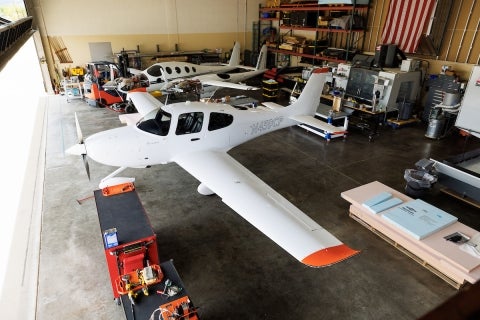
Photo by Joe Johnston | Cal Poly University Photographer
Iscold said he expects the aerospace industry will request students conduct UAV research on its behalf, providing Cal Poly engineering and computer science students key connections and hands-on industry experiences.
Last summer, through separate funding, Cal Poly celebrated the partnership to further research on mini-satellite technology known as CubeSats, a now standardized platform in use by K-12 schools, universities and industry around the world that was developed more than 20 years ago by former Cal Poly Aerospace Engineering Professor Jordi Puig-Suari and Bob Twiggs of Stanford University.

